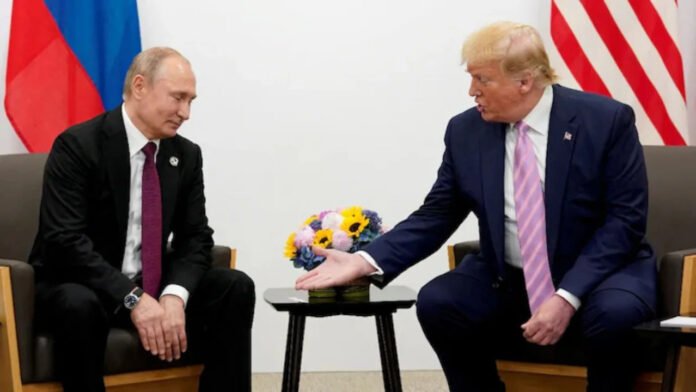The cancelled summit between Donald Trump and Vladimir Putin in Budapest has since become synonymous with something bigger in its failure to maintain diplomacy in a world that now appears at ease, trading threats as opposed to words. Budapest had been floated as neutral ground weeks in advance, a place where two strong characters would get an opportunity to resolve complexities and give peace a chance. Diplomacy failed even before it was confronted.
The Prime Minister of Hungary, Viktor Orbán, had envisioned the city as a venue for the meeting of East and West, a European capital that could host peace dialogues. However, the illusion was fractured. Moscow had a long list of demands, which were far from a compromise: the acknowledgement of control over the Donbas region, the withdrawal of Ukrainian troops, the non-admission of NATO observers, and assurance of Ukraine’s neutrality. There was also an unmistakable expectation that the political order in Kyiv would somehow ‘adjust’ to Russian comfort levels.
Washington, Kyiv, and most of Europe saw that as a peace dictated from the barrel of a gun. To accept it would have meant an unfavourable outcome and rewriting international law to suit power. The summit was doomed before the invitations were finalised.
Moscow’s demands included the acknowledgement of control over the Donbas region, the withdrawal of Ukrainian troops, the non-admission of NATO observers, and assurance of Ukraine’s neutrality. Washington, Kyiv, and most of Europe saw that as a peace dictated from the barrel of a gun
Why the Talks Fell Apart
The failure of Budapest isn’t about poor planning; it’s about politics frozen in concrete. Both Moscow and the West have trapped themselves in absolute positions. Russia insists its security can only be ensured by reshaping its neighbours. The West insists peace can only come once Ukraine’s borders and government are fully restored. Neither argument is without logic, but taken together, they make negotiation impossible.
Diplomacy dies when every conversation begins with ‘non-negotiable’ points and a rigid stand. For Russia, compromise risks humiliation; for the West, it risks moral collapse. The Budapest fiasco simply exposed what has long been true: everyone wants peace, but only on their own terms.
Moscow’s Calculus: Control as Security
Inside Russia, the narrative remains one of siege. The Kremlin has convinced its people that NATO’s eastward drift is a direct threat to their existence. Ukraine’s Western alignment is portrayed as the final encirclement. Seen through that lens, the war becomes a defensive crusade rather than an invasion.
But defence has a way of mutating into domination. When a state starts demanding a say over another’s leadership and alliances, it is no longer protecting itself; it is seeking control. Moscow’s security logic, taken to its end, denies Ukraine the very right to exist as an independent political entity. That is why even sympathetic observers in Asia and Africa struggle to justify Russia’s stance. It seeks safety by eliminating the autonomy of others.
Both Moscow and the West have trapped themselves in absolute positions. Russia insists its security can only be ensured by reshaping its neighbours. The West insists peace can only come once Ukraine’s borders are fully restored. Neither argument is without logic, but they make negotiation impossible
Western Morality, Strategic Fatigue
On the other side, Western capitals cling to moral clarity but struggle with strategic stamina. The early unity of 2022 has frayed under economic pressure and political fatigue. European economies face energy stress, and in Washington, the Ukraine debate has turned partisan. Kyiv continues to resist bravely, but it is fighting with borrowed time and borrowed money.
The West’s refusal to engage Moscow directly until ‘conditions improve’ sounds principled but has trapped policy in limbo. The art of diplomacy has been delegated to the battlefield. Each side is waiting to see a change in the military momentum which will give them a better bargaining position. The result is predictable: stalemate dressed up as steadfastness.
The Cost of Deadlock
While leaders posture, the human and economic costs mount. Towns in eastern Ukraine are reduced to rubble. Millions remain displaced. Food and energy markets have been distorted worldwide, driving up inflation from Europe to Africa. What began as a regional conflict now drags the global economy into its undertow.
Equally worrying is the corrosion of faith in negotiation itself. If great powers stop believing in dialogue, smaller states will stop expecting it. The lesson many countries are drawing from this war is bleak — that force works faster than diplomacy, and that power, not persuasion, defines justice. That is a dangerous mindset to normalise.
It is time to abandon the illusion of a major peace agreement and concentrate on small, actionable steps. Mega summits do attract headlines but rarely outcomes. Small steps can develop over time into a broader approach. The process of diplomacy is not a linear leap, but is built on a step-by-step foundation of trust
A Smaller, Smarter Path Forward
Perhaps it is time to abandon the illusion of a major peace agreement and concentrate on small and actionable steps. Mega summits do attract headlines but rarely outcomes. Small steps may ultimately develop over time into a broader approach which, at the cost of no ideological capitulation, eases the humanitarian cost and examines the possibilities of political and security assurances. The process of diplomacy is not a linear leap, but is built on a step-by-step foundation of trust and confidence.
Such efforts will need neutral monitors who are trusted by both sides. Since NATO and Russia cannot be in the same observation team, countries like Switzerland, Austria or India could take the lead under a UN umbrella. Verification from neutral actors would help both sides climb down without losing face.
The Global South’s Lesson
For much of the Global South, including India, the Budapest cancellation is a cautionary tale. It shows how over-militarised diplomacy has become and why middle powers need to reclaim space for dialogue. India’s ability to maintain open lines with Washington, Moscow and Kyiv has given it a silent leverage. It should use that space to champion humanitarian negotiation – practical, apolitical, and sustained.
For the Global South, including India, the Budapest cancellation is a cautionary tale. It shows how over-militarised diplomacy has become and why middle powers need to reclaim space for dialogue. India’s ability to maintain open lines with Washington, Moscow and Kyiv has given it a silent leverage
Strategic autonomy is not neutrality; it is the freedom to act on one’s assessment of stability. As the world divides into rival camps, countries that can talk to both sides will become essential to any eventual peace. That is India’s quiet strength, and Budapest has only reinforced its importance.
Diplomacy Needs Humility, Not Heroics
The cancellation of the Budapest summit is not a failure but a lesson, showing how far diplomacy has drifted from patience and subtlety. In a more measured era, envoys talked for months before leaders met. Now summits are staged for cameras and hashtags, not for compromise. That is not diplomacy, it is theatre.
Budapest failed because everyone wanted to be a winner, not to find an amicable solution. Such complex conflict situations need a different mindset: less ego, more patience, and greater empathy. The question, therefore, is not whether diplomacy can still work. It is whether the world’s leaders have the humility to let it. The Budapest cancellation is both a warning and an opportunity, a reminder that while power can destroy, only diplomacy can rebuild.
The author, a PVSM, AVSM, VSM has had an illustrious career spanning nearly four decades. A distinguished Armoured Corps officer, he has served in various prestigious staff and command appointments including Commander Independent Armoured Brigade, ADG PP, GOC Armoured Division and GOC Strike 1. The officer retired as DG Mechanised Forces in December 2017 during which he was the architect to initiate process for reintroduction of Light Tank and Chairman on the study on C5ISR for Indian Army. Subsequently he was Consultant MoD/OFB from 2018 to 2020. He is also a reputed defence analyst, a motivational speaker and prolific writer on matters of military, defence technology and national security. The views expressed are personal and do not necessarily carry the views of Raksha Anirveda






